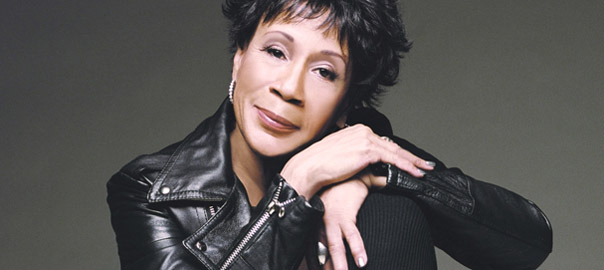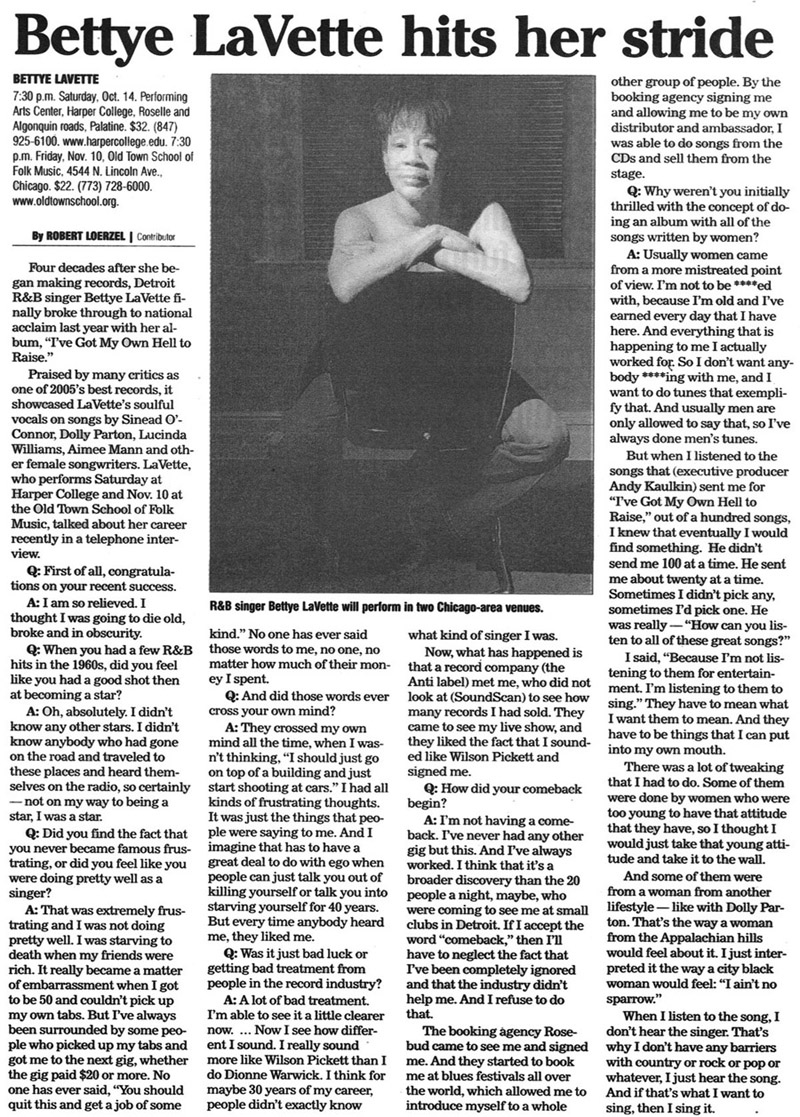This article by Robert Loerzel originally appeared in Pioneer Press on December 5, 2007.
Four decades after she began making records, Detroit R&B singer Bettye LaVette finally broke through to national acclaim last year with her album, “I’ve Got My Own Hell to Raise.”
Praised by many critics as one of 2005’s best records, it showcased LaVette’s soulful vocals on songs by Sinead O’Connor, Dolly Parton, Lucinda Williams, Aimee Mann and other female songwriters. LaVette … talked about her career recently in a telephone interview.
Q: First of all, congratulations on your recent success.
A: I am so relieved. I thought I was going to die old, broke and in obscurity.
Q: When you had a few R&B hits in the 1960s, did you feel like you had a good shot then at becoming a star?
A: Oh, absolutely. I didn’t know any other stars. I didn’t know anybody who had gone on the road and traveled to these places and heard themselves on the radio, so certainly — not on my way to being a star, I was a star.
Q: Did you find the fact that you never became famous frustrating, or did you feel like you were doing pretty well as a singer?
A: That was extremely frustrating and I was not doing pretty well. I was starving to death when my friends were rich. It really became a matter of embarrassment when I got to be 50 and couldn’t pick up my own tabs. But I’ve always been surrounded by some people who picked up my tabs and got me to the next gig, whether the gig paid $20 or more. No one has ever said, “You should quit this and get a job of some kind.” No one has ever said those words to me, no one, no matter how much of their money I spent.
Q: And did those words ever cross your own mind?
A: They crossed my own mind all the time, when I wasn’t thinking, “I should just go on top of a building and just start shooting at cars.” I had all kinds of frustrating thoughts. It was just the things that people were saying to me. And I imagine that has to have a great deal to do with ego when people can just talk you out of killing yourself or talk you into starving yourself for 40 years. But every time anybody heard me, they liked me.
Q: Was it just bad luck or getting bad treatment from people in the record industry?
A: A lot of bad treatment. I’m able to see it a little clearer now. … Now I see how different I sound. I really sound more like Wilson Pickett than I do Dionne Warwick. I think for maybe 30 years of my career, people didn’t exactly what kind of singer I was.
Now, what has happened is that a record company (the Anti label) met me, who did not look at (SoundScan) to see how many records I had sold. They came to see my live show, and they liked the fact that I sounded like Wilson Pickett and signed me.
Q: How did your comeback begin?
A: I’m not having a comeback. I’ve never had any other gig but this. And I’ve always worked. I think that it’s a broader discovery than the 20 people a night, maybe, who were coming to see me at small clubs in Detroit. If I accept the word “comeback,” then I’ll have to neglect the fact that I’ve been completely ignored and that the industry didn’t help me. And I refuse to do that.
The booking agency Rosebud came to see me and signed me. And they started to book me at blues festivals all over the world, which allowed me to introduce myself to a whole other group of people. By the booking agency signing me and allowing me to be my own distributor and ambassador, I was able to do songs from the CDs and sell them from the stage.
Q: Why weren’t you initially thrilled with the concept of doing an album with all of the songs written by women?
A: Usually women came from a more mistreated point of view. I’m not to be ****ed with, because I’m old and I’ve earned every day that I have here. And everything that is happening to me I actually worked for. So I don’t want anybody ****ing with me, and I want to do tunes that exemplify that. And usually men are only allowed to say that, so I’ve always done men’s tunes.
But when I listened to the songs that (executive producer Andy Kaulkin) sent me for “I’ve Got My Own Hell to Raise,” out of a hundred songs, I knew that eventually I would find something. He didn’t send me 100 at a time. He sent me about twenty at a time. Sometimes I didn’t pick any, sometimes I’d pick one. He was really — “How can you listen all of these great songs?”
I said, “Because I’m not listening to them for entertainment. I’m listening to them to sing.” They have to mean what I want them to mean. And they have to be things that I can put into my own mouth.
There was a lot of tweaking that I had to do. Some of them were done by women who were too young to have that attitude that they have, so I thought I would just take that young attitude and take it to the wall.
And some of them were from a woman from another lifestyle — like with Dolly Parton. That’s the way a woman from the Appalachian hills would feel about it. I just interpreted it the way a city black woman would feel: “I ain’t no sparrow.”
When I listen to the song, I don’t hear the singer. That’s why I don’t have any barriers with country or rock or pop or whatever, I just hear the song. And if that’s what I want to sing, then I sing it.

